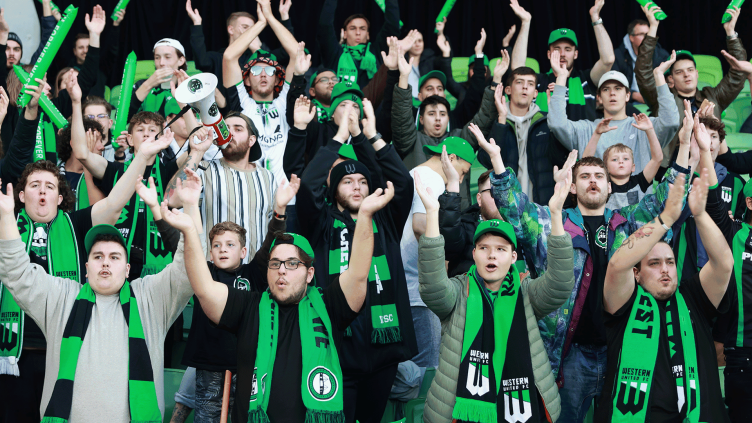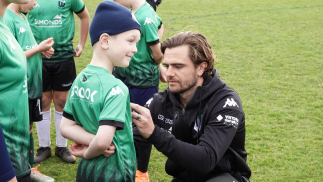He owns the most iconic moment in the history of the beautiful game in Australia. It was 16 November 2005 and, after 31 years of heartbreak, the Socceroos were one penalty kick away from qualifying for the World Cup.
John Aloisi had practiced penalties the day before: five penalties for five perfect executions. He remembers feeling almost euphoric as he walked to the penalty spot. ‘Do exactly what you did the day before,’ he remembers saying to himself, ‘and we’re going to the World Cup’. He stepped out his run. Didn’t look at the goalkeeper. Made his approach.
‘Sweet’ is the word he uses to describe the contact. He then experienced a surreal moment that sits at the pinnacle of an incredible career during which Aloisi became the only Australian to play in Europe’s three most prestigious leagues.
‘I’m thinking, “That’s in,” but I haven’t heard one bit of noise from the crowd. There’s a photo of me running off with a serious face, thinking, “I hope it has gone in,” and then the net moves and, about half a second later, pandemonium!’
Sport gives us these transcendent, nationally significant moments. But it now also has a secondary narrative that bubbles underneath everything that is great and pure about elite competition. It’s the language of gambling, and the saturation marketing of win/loss odds blended so intricately into the coverage of the game that fans could be mistaken for thinking they are part of the game.
‘When I first started playing, I can’t remember these ads at all,’ says Aloisi. ‘It was all either alcohol or cigarettes.’ Now coach of Western United, he first noticed sports betting playing for Portsmouth in 1997.
‘We’d have a booklet before the game, and it would have first goal scorer and you’d be given the odds. And then I started to hear about “first goal kick”, “first corner”, “how many seconds before the ball goes out of play”. I’d be going, wow, you can bet on anything. This is serious stuff.’
Aloisi was never tempted to gamble himself. Even leaving aside football betting, which is now banned for all players and officials on any football match of any code being played anywhere in the world, Aloisi never felt the pull of racetracks, casinos or high stakes card games.
‘My dad used to say, “Don’t throw away your money because it’s hard earned, and it’s easy to lose,” so I never really had the urge.’
But professional footballers often have a dangerous combination of high disposable income and free time.
‘I remember a teammate at Portsmouth,’ Aloisi says, ‘who was so into his gambling that he’d listen to the races in the toilets before we’d go out for a warmup. If he lost, he’d be all down. If he won, he’d be on such a high. I thought, that can’t be healthy. Not just for him as a person, but also, how are you going to play?’
But the Socceroos great didn’t receive education about the risks of gambling and gambling harm from the leagues or the clubs. ‘I was just fortunate I had an upbringing that taught me not to do it,’ he says.
Aloisi is proud that Western United is now an elite sporting club partner in the Foundation’s ‘Love the game’ program. All partners play a critical role in influencing the attitudes and behaviours of their fan base to disrupt the normalisation of gambling and sport, and deepen understanding of gambling harm as a public health issue.
‘I do feel pride because I believe in it,’ says Aloisi. ‘I’m not saying for people not to gamble at all. I’m saying, educate … get people to understand why they’re doing it. Is it just to have fun? But if you think you’re going to make serious money out of it, think again. And that shouldn’t just come from parents; that should be through schools and clubs too.’
His Western United players now receive education about gambling harm from the players association (PFA) and the league (FLA).
‘They come out once a year,’ Aloisi says. ‘The players get taught they can’t bet on any other sporting event. But they also talk generally about the risks of gambling.’
Many of his players sit in the age demographic that is most vulnerable. One in three sports bets are placed by men aged 18 to 24, and participation by young women is increasing too.
‘I know this because my daughters are 20 and 18 and their friends or their friends’ boyfriends are gambling a lot, not only on sport, but just in general.
‘I know it’s out there and I can see it.’
Author Bio:
Tony Wilson is an author, broadcaster and sports lover who has written books for kids and adults.
He wrote Australia United: Adventures around World Cup Germany about the thrill of being a fan at the 2006 World Cup. His 2010 Good Weekend feature in The Age on Archie Thompson and Melbourne Victory made an anthology of that year’s best sports writing.
His book 1989: The Great Grand Final takes on the Hawthorn versus Geelong AFL classic while The Selwood Boys is a children’s book series.
Tony made the feature-length footy documentary The Galahs about the 1967 Australian football tour to Ireland, and he is now in post-production on a film about Ferenc Puskas and his time at South Melbourne Hellas.





